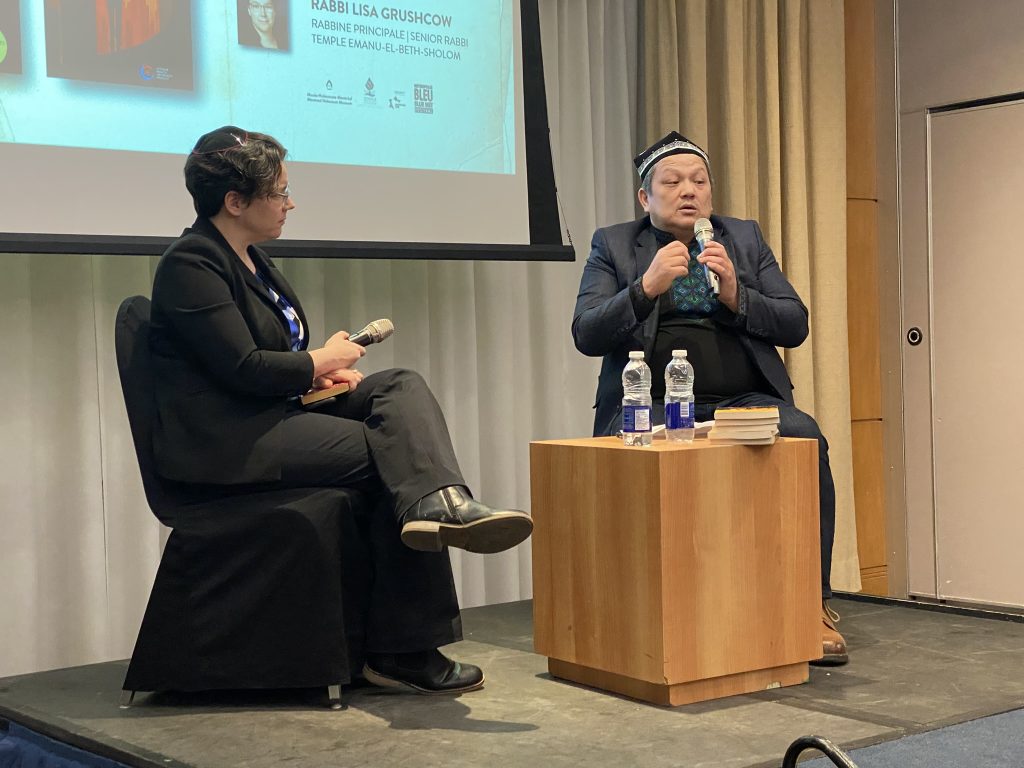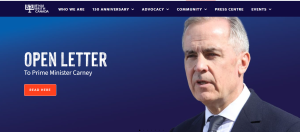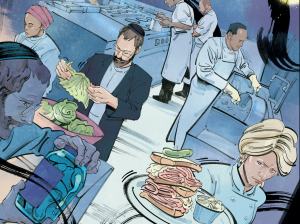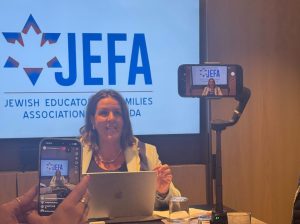“Everything can be taken from a man but one thing,” Viktor Frankl famously penned in Man’s Search for Meaning, one of the most impactful literary works of the 20th century, “the last of the human freedoms—to choose one’s attitude in any given set of circumstances, to choose one’s own way.”
It was but one of many stirring passages that Kayum Masimov took in hand—and mind—when first reading Frankl’s book in Russian five years ago. A friend had recommended that Masimov, the Canadian representative to the World Uyghur Congress and a project coordinator for the Uyghur Rights Advocacy Project, read Frankl’s chronicle as a concentration camp prisoner, which has been translated into more than 50 languages and sold more than 60 million copies since first being published in 1946.
His reaction was immediate. “It’s a direct parallel to what I have experienced interviewing so many Uyghurs, especially those who came from concentration camps,” he told The CJN at the launch of a Uyghur translation of Frankl’s classic at the Montreal Holocaust Museum (MHM). The book debuted on Dec. 10, Human Rights Day, marking the day in 1948 that the United Nations General Assembly adopted the Universal Declaration of Human Rights.
“What struck me personally was when I read that this has happened before us. It’s a must-read for our community, especially now. I hate doing parallels and comparisons with other tragedies, but I cannot but think and observe these commonalities between our communities.”
Frankl’s survival story has helped generations worldwide cope with suffering, said Temple Emanu-El-Beth Sholom’s Rabbi Lisa Grushcow, who added that many Jews today acknowledge that “nobody was there for us when this was happening to us, so how can we be silent when this is happening to anyone else?”
Since China invaded East Turkistan in 1949, more than a year before entering Tibet, the region was prone to violence and repression through forced displacement, slave labour, civil rights erasure, rape, incarceration and much more. China has intensified its efforts since President Xi Jinping took power in 2012, says Masimov.
“Over the last 10 or so years, it became intolerable—all-out war against the community. And not only Uyghurs, but all native people living in the region, including Kazaks, Uzbeks, Tartars, predominantly Turkic-speaking Muslims.”

According to rights groups, some 7 million people have been subjected to so-called re-education in China. With some 2,000 Uyghurs in Canada, a community established over the last 20-plus years, Masimov says “not a single Uyghur Canadian family has not been affected by this. And I thought this book will be a good thing because our community is so deeply traumatized, and this will be a good starting point to initiate conversations.
“The fact that I’m here with you, at the Holocaust Museum itself, and talking about it, is a part of the trauma healing for myself, sharing my pain.”
While China declares the number of Uyghurs at 12 million, the Uyghur rights groups put the real population at about 20 million, with about 100,000 in the global diaspora. Canada’s community is among the smallest. (The largest diaspora is in Turkey, estimated between 50,000-80,000 refugees.) “We are the canary in the coal mine in Canada,” says Masimov, who himself has been subject to harassment, intimidation and even death threats as far back as 2007 as a result of his advocacy.
He’s lost track of many members of his own family for several years. “There are people who have heard nothing from 40 family members for a decade,” he says. “My story is not unique at all. We all live with this, every day.” He says post-traumatic stress disorder and intergenerational trauma are evident among Canada’s Uyghur community.
Having acted as interpreter to many ex-concentration camp detainees during Canadian parliamentary hearings, Masimov spoke of hearing accounts of widespread rape and torture, “all this unimaginable cruelty. And the big question looming over my shoulders and that I heard many times from survivors: Why God allows this? What did we do wrong?”
When transmitting the human rights legacy of the Holocaust, MHM president Jacques Saada says, “It is precisely moments like tonight that help accomplish this crucial responsibility. This launch highlights the tragic yet resilient connection between Jewish and Uyghur communities and the importance of allyship in confronting genocide today.”
The project took over a year to complete, spurred on by Masimov and activists Marc Grushcow and Phil Kretzmar, who secured the publication rights and a translator who is anonymously credited on the book for fear of reprisals against their vulnerable family in China.
Frankl, a psychiatrist, originally penned his prescription for survival in German, and its new Uyghur versions are written in both Latin and Arabic script, with a possible Cyrillic edition coming, Masimov said in discussion with Rabbi Grushcow.
Free electronic versions are available for download online for anyone wishing to read, share or help raise awareness of the Uyghurs’ plight. “It’s not about selling anything,” says the rabbi’s father, Marc Grushcow. “It’s about rachmones” (compassion).
“China became a victim of its own success,” Masimov said. “It was so successful in suppressing us and other communities that it came to the point that even outsiders began wondering what is happening and posing questions.”
Rabbi Grushcow says the book’s profound takeaway is not just about surviving oppression, “but about maintaining human dignity, meaning, about psychological autonomy in the face of systematic attempts to destroy those fundamental capacities of any human being.”
Rights groups believe at least one million Uyghurs, Kazakhs and other mostly Muslim minorities have been incarcerated in Chinese internment camps.
“This is the largest incarceration or detention of any ethnic group in the world since the Holocaust,” says Masimov, who also spoke of organ harvesting, nuclear explosions resulting in high cancer rates, environmental degradation and a mass inflow of Chinese migrants, boosting the presence of ethnic Chinese in the region from five percent to surpassing 40 percent today. He also listed the widespread use of slave labour in the production of clothing, solar panels, food and other products found globally.
In February 2021, Canada’s parliament acknowledged the genocide and, in 2023, it launched an initiative to resettle 10,000 Uyghur refugees from third-party states, the first of whom arrived in Canada this week.
Asked what would happen if the world continues to do “almost nothing,” Masimov shared a sobering prognostic: “Within 20 to 30 years, we are facing the extinction of a 25-million-strong ethnic group.”
He says there is no long-term solution for China to keep its existence “as it is, as a political system. The first victims of the Chinese Communist Party are Chinese people themselves, right? It will come to the point that they will decide that it will be done. It’s not sustainable in the long term. I am optimistic on that… But the question is, will our community—along with others like Tibetans, Mongols—survive that? Because at the current rate, it is quite possible that within 20-30, years we will be gone as a group, which is a loss not only to us, but to Chinese civilization and the world.”
The Montreal Holocaust Museum has worked closely with Canada’s Uyghur community over the last few years to discuss pedagogical matters, says MHM head of communications Sarah Fogg. “We’ve done some beautiful bridge-building. We were there to show them what’s possible, how we handle exhibitions and artifacts.” Executive director Daniel Amarsays such collaborationis part of the mission “to strengthen links with other communities who suffered genocide (such as the Rwandan and Cambodian communities).”
Fogg says that part of the mission remains a challenge. “I don’t think it’s a stretch to say that people are not aware of this type of work that we do, as our core mission is still to educate anyone and everyone about the Holocaust and its legacy and teach about the dangers coming from unchecked antisemitism and unchecked hate.”
What stunned Marc Grushcow “was the parallel of the Jews of the 1930s in Germany into the war and the Uyghurs in China. Starting with the exclusion from society, family separation and forced assimilation. Uyghurs are subject to incarceration and forced labour, documented rape, forced sterilization of women, and it’s all part of China’s stated policy to erase Uyghurs through assimilation.”
Rabbi Grushcow recalled that the Jewish community must do “as much as we need to, to help each other, especially these days. We turn inward, of course, but there is also part of our tradition that says, ‘Remember the stranger, because you were a stranger.’ That we should not just look out for ourselves, but others.”
The situation of the Uyghurs is a grossly under-reported atrocity, she said, “and ‘genocide’ gets thrown around so much in terms of Israel and Palestine, wrongly. But in this case the markers of genocide and what is being done in China is so clear and how China has managed to keep this out of the headlines.”
On Oct. 10, 2023, she recalls, Canada’s Uyghur Rights Advocacy Project came out with a strong condemnation of the terrorist attacks on Israel, adding, “Anything we do with other communities, sometimes it’s strategic: we stand for you, you stand for us… That’s all well and good, but sometimes it’s just the right thing to do.”
Kasimov lauded the support of Canada’s Jewish community in his community’s plight and efforts. “Unfortunately, this has not been matched by our co-religionists,” noting that Palestinian Authority president Mahmoud Abbas declared his support for China’s policies last year, “and said China’s re-education camps and everything they are doing are just.”
Indeed, in a June 2023 statement, the PA stated China’s policy toward Muslims in Xinjiang has “nothing to do with human rights and are aimed at excising extremism and opposing terrorism and separatism.” Abbas also characterized criticism of China’s treatment of Uyghurs as interference in internal affairs. That elicited a reminder from MHM president Jacques Saada, who noted, “Abbas also wrote a book in which he justified the Holocaust, so we are again sharing a common point here.”
That’s why collaboration with the city’s Holocaust museum and its “outward-looking element, sharing that legacy about education” is so important, says Rabbi Grushcow. “We have so much history that matters with what’s going on with the Uyghurs.”
Showing compassion and support is no zero-sum game, she agrees: “Morally, it’s incumbent on us to do the right thing. The fact that it’s Victor Frankl, it’s extraordinary that this Jewish human memoir found its way into the hearts of the Uyghur community.”
Author

Joel has spent his entire adult life scribbling. For two decades, he freelanced for more than a dozen North American and European trade publications, writing on home decor, HR, agriculture, defense technologies and more. Having lived at 14 addresses in and around Greater Montreal, for 17 years he worked as reporter for a local community newspaper, covering the education, political and municipal beats in seven cities and boroughs. He loves to bike, swim, watch NBA and kvetch about politics.
View all posts








